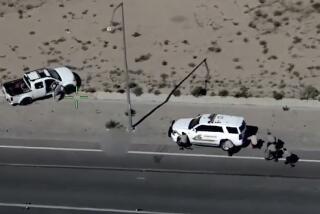Federal Marshal Denies Shooting Separatist’s Son : Hearing: In testimony before Senate panel, he and a colleague in Idaho siege say they believe the boy was killed by his own father, Randy Weaver.
- Share via
WASHINGTON — Two deputy U.S. marshals who survived the 1992 shootout at Ruby Ridge, Ida., testified Friday that they believe white separatist Randy Weaver--and not one of the marshals--accidentally shot and killed his own son.
Under questioning by members of the Senate Judiciary subcommittee on terrorism, Larry T. Cooper denied that he had fired the fatal bullet that went through 14-year-old Sammy Weaver’s back. Fellow Deputy Marshal Arthur D. Roderick, who acknowledged shooting the boy’s dog, supported Cooper’s conclusion.
“We believe Mr. Weaver accidentally shot Sammy Weaver in the back,” Roderick said.
Their testimony marked the first time that U.S. marshals have publicly alleged that Weaver, who has denied firing his gun during the incident, discharged the bullet that killed his son.
Subcommittee Chairman Arlen Specter (R-Pa.) said that he was “quite surprised” by the allegation. “I think it requires further investigation,” Specter said, noting that only Randy Weaver and Cooper were using 9-millimeter weapons on Aug. 21, 1992, the day the fatal siege began.
During the 1993 trial in which Randy Weaver and his friend, Kevin Harris, were acquitted of killing Deputy Marshal William E. Degan, a government expert testified that the wound in Sammy Weaver’s back was consistent with a 9-millimeter bullet. The slug that killed the boy was never found.
“It’s a very important matter,” Specter said, pointing out that the marshals have been blamed for Sammy Weaver’s death, which set off a series of events leading to deployment of the FBI hostage rescue team.
On the following day, an FBI sniper killed Weaver’s wife, Vicki, as she stood hidden by the door of the family’s cabin.
Weaver, appearing before the subcommittee last week, said that he believes Cooper deliberately shot his son as the boy ran uphill toward his father.
But Cooper was adamant in his denial as he recounted the attempt by a marshals’ surveillance team to surreptitiously check out the terrain around Weaver’s cabin to set up an undercover operation for taking Weaver into custody to face trial on weapons charges.
Cooper was discovered and pursued by Weaver, his son and dog and Kevin Harris. When Harris reached a point about 10 feet in front of Degan, Cooper said, Degan called out: “Stop, U.S. marshals!”
Before Cooper could finish uttering a similar warning, “Harris turned, fired from the hip and shot Deputy Degan,” Cooper said.
“I have a clear mental picture of Kevin Harris firing that first shot. . . . There is no other aspect of this tragedy about which I am more certain,” Cooper said.
While he fired at and thought he had hit Kevin Harris, Cooper said, “I did not fire at Samuel Weaver.”
Attempting to go to the aid of Degan, Cooper said, he rose from behind a rock where he had taken cover to fire his second and final round in the direction of the gunfire aimed at him.
“I saw Samuel Weaver through the gaps in the foliage, running” toward a trail leading to the Weaver compound, he said.
Specter asked Roderick how he accounted for an autopsy finding that the 9-millimeter bullet that killed Sammy Weaver was traveling upward. Roderick responded that Randy Weaver had run into the woods and was firing back.
The elder Weaver “very easily could have been on lower ground” than his son when the fatal shot was fired, Roderick said.
Citing testimony by the government doctor that Cooper had fired the shot that killed the Weaver boy, Specter asked Roderick why he disagreed.
“I tend to believe Deputy Cooper’s testimony as opposed to Mr. Weaver’s testimony,” Roderick said.
Specter opened the hearing by reading a five-page letter from Degan’s widow, Karen, who attended the hearing but was too emotional to read it herself.
She wrote that her husband, one of the government’s most decorated marshals, had thought that the Weaver apprehension would be his final field assignment for the service’s special operations group.
“What kind of message has the government sent my two boys by paying the Weavers millions of dollars for the events of Ruby Ridge?” she asked, referring to the $3.1-million settlement reached with Weaver and his children.
“As it stands right now, the message is that this is a topsy-turvy world where those who defy the law are somehow transformed into heroes and martyrs and those who work to enforce the law are labeled ‘trained killer.’ ”
More to Read
Get the L.A. Times Politics newsletter
Deeply reported insights into legislation, politics and policy from Sacramento, Washington and beyond. In your inbox twice per week.
You may occasionally receive promotional content from the Los Angeles Times.









